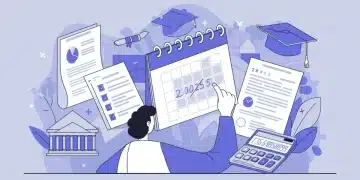Apprenticeship and graduate loan limits: what you need to know

Apprenticeship and graduate loan limits dictate how much students can borrow for education, thereby impacting their choice of programs, financial planning, and overall educational opportunities.
Apprenticeship and graduate loan limits are crucial aspects of funding your education journey. Many potential students feel overwhelmed by their options and the financial implications. How do these limits shape your choices and future opportunities?
Understanding apprenticeship loans
Understanding apprenticeship loans is essential for anyone considering this educational path. These loans provide financial support to students pursuing vocational training while they work. Let’s explore what these loans entail and how they can help you.
What are apprenticeship loans?
Apprenticeship loans are specifically designed to assist individuals who are enrolled in apprenticeship programs. These programs combine on-the-job training with classroom instruction, allowing students to earn a wage while they learn. This means you can gain valuable experience without incurring excessive debt.
Key features of apprenticeship loans
- Low-interest rates that make repayment manageable.
- Flexible repayment options to accommodate learners.
- Potential for loan forgiveness based on certain criteria.
These features are just a few reasons why apprenticeship loans might be a good fit for you. They can ease the burden of educational costs while you gain practical experience in your chosen field. Moreover, many apprenticeship programs are industry-recognized, which can enhance your employability.
Furthermore, it’s important to understand the terms and conditions associated with these loans. Each lender might have different criteria, including eligibility requirements and interest rates. Always read the fine print and consult with a financial advisor if needed. Armed with this knowledge, you can make informed decisions that align with your career goals.
Graduate loan limits explained

Understanding graduate loan limits is critical for students aiming to further their education. These limits establish how much money you can borrow while pursuing graduate studies.
Types of graduate loans
There are typically two main types of loans available for graduate students: federal loans and private loans. Federal loans generally offer lower interest rates and more flexible repayment options compared to private loans. It’s essential to explore both options and understand what they entail.
What are the limits?
The limits for federal loans can vary based on your program and the institution you attend. Generally, graduate students may borrow up to $20,500 per year under the Direct Unsubsidized Loan program. However, if you are a medical or dental student, you might be eligible for higher limits.
- Direct Unsubsidized Loans: Up to $20,500 per year.
- Higher limits available for specific health profession programs.
- Total borrowing limit also includes undergraduate loans.
It’s important to note that while these limits provide a guideline, they may not cover the entire cost of your education. This is where understanding your overall financial plan becomes crucial. Consider budgeting for living expenses, textbooks, and other fees that come with graduate school.
Moreover, if you find that you need additional funding beyond the federal limits, private loans can fill in the gaps. However, they come with stricter qualifications and can have higher interest rates. Always weigh your options carefully and read the terms before committing.
How loan limits impact your education choices
How loan limits impact your education choices is an important consideration for any student. Understanding these limits can influence your decision on which programs to pursue.
Influence of loan limits on program selection
When students realize the maximum amount they can borrow, it shapes their choice of schools and degrees. Some programs may be more costly, pushing students to evaluate their financial options carefully.
Financial planning and budgeting
Loan limits also affect how students budget their expenses. If the available loan amount does not cover tuition and living costs, students may need to explore scholarships or part-time work. This careful planning is crucial for affordability.
- Assess the full cost of attendance, not just tuition.
- Factor in living expenses, books, and supplies.
- Look for grants and scholarships to reduce dependency on loans.
Moreover, knowing the limits can empower students to negotiate better terms with private lenders if they need additional support. It’s essential to compare different loan products and understand their terms before making commitments.
Accessibility to funds can also dictate which institutions are within reach. Some students might aim for higher education programs that align with their career goals but require substantial investment. Understanding loan limits can help set realistic educational targets.
Tips for managing your education loans

Managing your education loans effectively can make a significant difference in your financial future. Here are some strategies to help you stay on top of your payments.
Create a budget
Start by creating a detailed budget that includes all your income and expenses. This helps you see where your money goes and where you can cut costs. Allocating funds for your loan payments should be a top priority.
Know your loan details
Understanding your loan terms is crucial. Familiarize yourself with the interest rates, repayment schedules, and any grace periods. This knowledge will prepare you for when repayments start.
- Verify whether your loan is subsidized or unsubsidized.
- Check if there are any penalties for early repayment.
- Understand what you need to do if you encounter financial hardship.
If you find yourself struggling, don’t hesitate to reach out to your loan servicer. They can offer options like deferment, forbearance, or alternative repayment plans. Communication is key when it comes to managing loans efficiently.
Another effective way to manage loans is to keep track of your payments. Consider using apps or spreadsheets that allow you to monitor your progress. Setting reminders for payment dates can also help prevent late fees.
Lastly, look for opportunities to reduce your loan burden. Applying for forgiveness programs or considering income-driven repayment plans can be beneficial. Keeping an eye on different options will ensure that you’re making the best choices for your financial situation.
In conclusion, managing your education loans effectively is essential for your financial well-being. By creating a budget, understanding your loan terms, and staying organized, you’ll be better prepared to tackle your payments. Remember to explore all your options to reduce your debt burden, such as loan forgiveness programs and alternative repayment plans. The steps you take now will pave the way for a brighter financial future.
FAQ – Frequently Asked Questions about Education Loans
What are education loans?
Education loans are financial aids designed to help students pay for their tuition and associated costs while attending school.
How can I manage my education loans effectively?
You can manage your education loans by creating a budget, tracking payments, and understanding your loan details and options for repayment.
What should I do if I can’t make my loan payments?
If you can’t make your payments, contact your loan servicer to discuss options such as deferment, forbearance, or alternative repayment plans.
Are there loan forgiveness programs available?
Yes, many loan forgiveness programs are available for graduates in specific fields, especially in public service roles.





